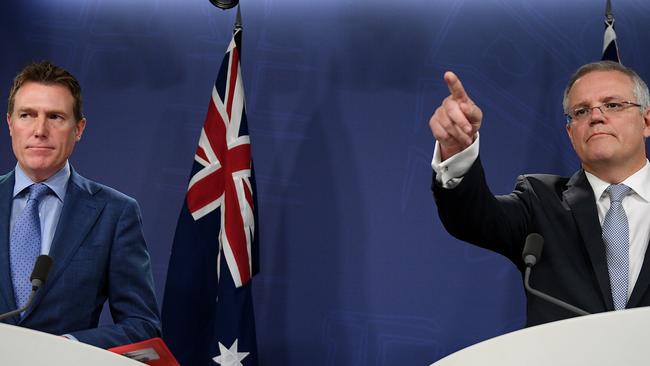Morrison faces integrity body fight
Scott Morrison’s push to establish a national integrity commission before the election is unlikely to pass through parliament.

Scott Morrison faces a battle to establish a national integrity commission before the election, with crossbenchers and Labor labelling the $125 million proposal a “secret tribunal” and “toothless”.
Announced yesterday to neutralise Bill Shorten’s pledge to set up a federal anti-corruption watchdog, the commission would not consider retrospective cases and would hold closed-door hearings for investigations into MPs, political staffers and bureaucrats.
Under the government proposal, the national integrity body would have 150 employees and be split into two branches, each with a deputy reporting to an integrity commissioner.
Independent MP Bob Katter was the only lower-house crossbencher to express initial support for the commission in its current form but the Prime Minister — who leads a minority government — will have to win over at least one more independent to get the legislation through the House of Representatives.
He will then have to gain the support of eight out of 10 Senate crossbenchers to legislate the commission, if Labor and the Greens oppose the bill.
Gary Sturgess, the architect of NSW’s powerful Independent Commission Against Corruption, yesterday backed the “less aggressive” model chosen by the Morrison government, saying the case had not yet been made for an agency with more teeth.
Government sources said it would be difficult to establish the body — expected to cost $125m over the forward estimates — before the election but they planned to at least have an exposure draft bill ready to put to the people before the expected May poll.
GRAPHIC: The new integrity commission
Since claiming the leadership from Malcolm Turnbull on August 24, Mr Morrison has attempted to remove political barnacles. The adoption of an integrity commission is a major policy shift for the government after Attorney-General Christian Porter said recently it was not a priority. It follows moves to establish a royal commission into the aged-care sector, increased funding for Catholic and independent schools, fast-tracked company tax cuts for small businesses, and the dumping of the national energy guarantee.
After months of pressure from the opposition, the Greens and independents to legislate an anti-corruption commission, Mr Morrison yesterday unveiled a body that could investigate “serious criminal conduct” but would ultimately hand over its findings and recommendations to the Commonwealth Director of Public Prosecutions to take to court.
The Prime Minister said he believed the proposal, which had been worked on since January, was the best way to tackle corruption in federal public administration after examining alternative models such as state anti-corruption commissions.
“They learn the lessons, I think, from many of the failed experiments we’ve seen at a state jurisdiction level,” Mr Morrison said.
“I have no interest in establishing kangaroo courts that, frankly, have been used, sadly too often, for the pursuit of political, commercial or bureaucratic agendas in the public space. Those exercises have sought to undermine public confidence, not improve it. They’ve not added, I think, to the integrity of public administration and they’ve become playthings of the usual actors. That is not what we’re about. We’re about having a robust, resourced, real system that would protect the integrity of commonwealth public administration.”
The law-enforcement division of the new integrity commission would have jurisdiction over government agencies such as the Australian Federal Police, the Department of Home Affairs and the Australian Taxation Office. The public-sector division would oversee MPs, their staff, federal subcontractors and other public service departments and agencies.
Mr Morrison’s proposal would expand the Australian Commission for Law Enforcement Integrity, which already detects, investigates and prevents corruption. The law-enforcement division would have powers to hold public and private hearings, arrest people, enter and search premises, seize evidence and make corruption findings (though not to the standard of the criminal code) that would be handed to the CDPP for further investigation.
The public-sector division would have more limited powers and would not be able to exercise arrest warrants, hold public hearings or make findings of corruption, criminal conduct or misconduct. However, it could refer briefs of evidence to the CDPP.
The commonwealth integrity commission would not investigate complaints about ministers, MPs or staff from members of the public; it would only investigate if an agency such as the Australian Electoral Commission, AFP or Independent Parliamentary Expenses Authority made a referral.
The Opposition Leader said the proposal was “too little, too late” and “not a fair-dinkum anti-corruption commission”. He said it was limited in scope and power.
Centre Alliance senator Rex Patrick, whose party holds two Senate votes and one lower-house vote, urged the government to “revisit” the ban on public hearings for the public-sector division.
“These secrecy provisions are very similar to those that have bedevilled the South Australian ICAC,” Senator Patrick said. “This aspect of the proposal must be revisited. Where the commissioner thinks it is appropriate, public hearings should be permitted.”
Former Labor minister Stephen Conroy said the Morrison government’s proposal was the “least worst option” and urged Mr Shorten to consider backing the commission. Mr Shorten refused to say if Labor would support legislation to set up the commission or clarify if he believed politicians and their staff should be subjected to public hearings. “I sat down in January with the leading anti-corruption campaigners in Australia, representatives of Transparency International, former judges who’ve been in charge of successful anti-corruption bodies,” he said. “They made it clear there has to be some element of public engagement, otherwise it won’t have the educative effect.”
Law Council of Australia president Morry Bailes warned against unintended consequences that could have “devastating outcomes for those affected”. He said people’s lives could be destroyed “if we don’t get (the framework) right”.





